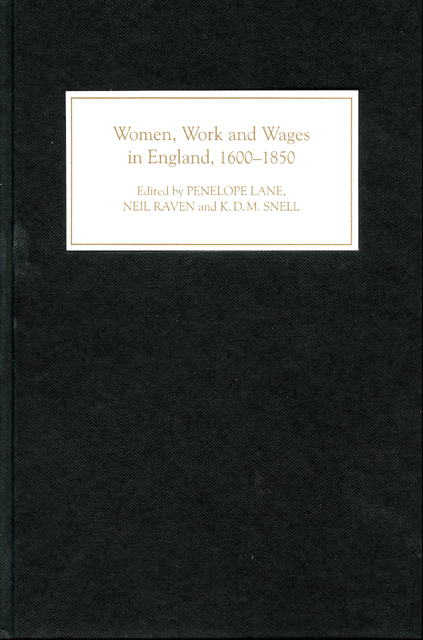Book contents
- Frontmatter
- Contents
- Illustrations
- Notes on Contributors
- Acknowledgements
- Introduction
- 1 ‘Waste’ Children? Pauper Apprenticeship Under the Elizabethan Poor Laws, c. 1598–1697
- 2 Gender at Sea: Women and the East India Company in Seventeenth-Century London
- 3 Sickles and Scythes Revisited: Harvest Work, Wages and Symbolic Meanings
- 4 A Customary or Market Wage? Women and Work in the East Midlands, c. 1700–1840
- 5 ‘Meer Pennies for My Baskitt Will be Enough’: Women, Work and Welfare, 1770–1830
- 6 Caring for the Sick Poor: Poor Law Nurses in Bedfordshire, c. 1770–1834
- 7 ‘A ‘Humbler, Industrious Class of Female’: Women’s Employment and Industry in the Small Towns of Southern England, c. 1790–1840
- 8 A Diminishing Force? Reassessing the Employment of Female Day Labourers in English Agriculture, c. 1790–1850
- Bibliography
- Index
3 - Sickles and Scythes Revisited: Harvest Work, Wages and Symbolic Meanings
Published online by Cambridge University Press: 21 March 2023
- Frontmatter
- Contents
- Illustrations
- Notes on Contributors
- Acknowledgements
- Introduction
- 1 ‘Waste’ Children? Pauper Apprenticeship Under the Elizabethan Poor Laws, c. 1598–1697
- 2 Gender at Sea: Women and the East India Company in Seventeenth-Century London
- 3 Sickles and Scythes Revisited: Harvest Work, Wages and Symbolic Meanings
- 4 A Customary or Market Wage? Women and Work in the East Midlands, c. 1700–1840
- 5 ‘Meer Pennies for My Baskitt Will be Enough’: Women, Work and Welfare, 1770–1830
- 6 Caring for the Sick Poor: Poor Law Nurses in Bedfordshire, c. 1770–1834
- 7 ‘A ‘Humbler, Industrious Class of Female’: Women’s Employment and Industry in the Small Towns of Southern England, c. 1790–1840
- 8 A Diminishing Force? Reassessing the Employment of Female Day Labourers in English Agriculture, c. 1790–1850
- Bibliography
- Index
Summary
My original ‘Sickles and scythes’ article was a response to the work of Eve Hostettler, who had had the good idea of using visual representations of harvest work in her discussion of the nineteenth-century sexual division of labour. I took that story back before 1800, and tried to use evidence of harvest scenes to chart the use of hand tools by men and women across a long period of time. My approach had several origins: some impatience with the imperialistic claims of nineteenth-century social historians; an early modernist’s commitment to demonstrating the fluidity and fertility of ‘preindustrial’ developments; a descendant of Lancashire weavers’ axiomatic understanding of the importance of women’s work; and an interest in the possibility of using new sources not only to explore historical topics but also to make visible to the reader the processes of historical enquiry. ‘Sickles and scythes’ was an experimental essay in what was then a young and experimental journal. In the issue in which it was published the editorial collective called for volunteers to pay larger subscriptions to support its expansion, adding rather defensively that ‘the Journal is now an unshakeable fact’. Born out of the exciting and often rowdy sessions of the History Workshop movement – crowded, contentious, and strenuously if variously committed to the broad political usefulness of the past – the journal invited a degree of mixed-media presentation, and of authorial self-reflection, which, even after more than a quarter of a century of Past and Present, were then (and possibly still are) unusual in British historical publications.
While the editorial collective did me proud with an excellent selection of illustrations, there was less agreement as to the role of the statistical tables. For their inclusion I had to argue firmly that their omission would actually be more condescending towards the hoped-for popular audience. There was also some editorial unease that I seemed to be arguing that women’s occupational roles might be determined by their physiology, having found that while women worked as reapers using sickles to cut the corn, they did not seem to be employed as mowers once the scythe came into common use for this purpose.
- Type
- Chapter
- Information
- Women, Work and Wages in England, 1600-1850 , pp. 68 - 101Publisher: Boydell & BrewerPrint publication year: 2004



